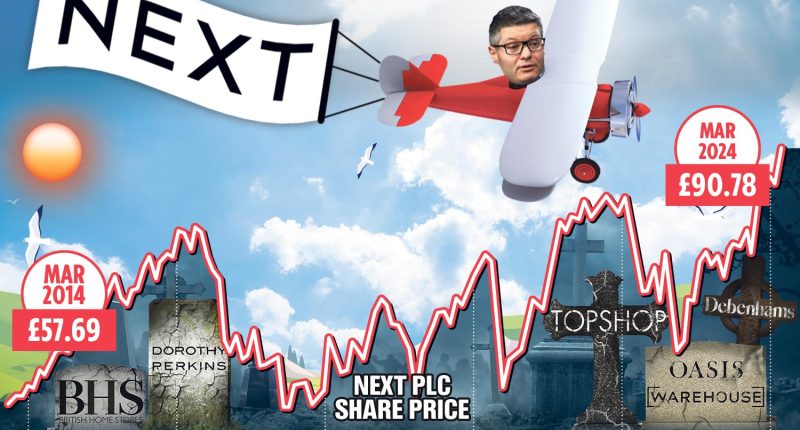THE boss of Next says the retailer is in its best position for seven years — and that the signs are also good for British shoppers.
Alongside posting a rise in profits, chief executive Lord Wolfson said wages were now rising higher than inflation, which would be good news for the economy and the high street.
He also reassured customers that prices would not be rising, there were no plans for store closures and signalled that inflation was coming down across the board.
“It has been a long time since we started a year in a more positive frame of mind,” said Lord Wolfson.
“This year is not without risks, but it is nothing like the guaranteed headwinds of the last seven years.”
The number of Next customers defaulting on credit purchases has also remained flat for the last four years.
read more on business
Lord Wolfson said that suggested Brits had been better at managing debts than any City bank had forecast.
The firm had a bigger than expected 5 per cent rise in pre-tax profits to £918million — while revenues went up 9.1 per cent to £5.9billion.
Shares rose 568p, or 6.6 per cent, to a record high of £90.78 yesterday.
The company’s £11.54billion valuation means it is now worth more than double rival Marks & Spencer — despite the latter’s own recent upturn.
Most read in Business
And the success is at odds with the toils of bust retailers including BHS, Topshop, Debenhams, Dorothy Perkins or Oasis and Warehouse — who failed to keep up with changing consumer tastes.
Next has used its headstart as a catalogue retailer — with warehouses and websites — to propel online sales, and the company is targeting further growth, with £216million to be spent this year alone on tech investment.
It is also building another warehouse that can add a third more online capacity.
Brands bought up by Next, including Fatface, Cath Kidston and Reiss, have broadened its portfolio choices to consumers.
It also plans to expand more internationally.
Next now makes 25 per cent of its online revenues from selling other brands — prompting Lord Wolfson to admit it had operated “online like a department store” for several years.
NO BANNING BEN & JERRY
UNILEVER’s plans to spin-off its ice cream division could face a brain freeze as Ben & Jerry’s board has defiantly vowed to continue its political activism.
Ben & Jerry’s — founded by Ben Cohen and Jerry Greenfield — has been known for progressive messaging, with its “Save Our Swirled Now” flavour tubs promoting climate change action.
However, it has been criticised for wading into global politics, demanding a ceasefire in Gaza, refusing to sell ice cream on the West Bank and accusing President Biden of “fanning the flames of war” in Ukraine.
Ben & Jerry’s has an independent board of directors, as part of Unilever’s takeover in 2000 but Unilever now wants to offload Ben & Jerry’s as well as its Walls, Magnum and Cornetto brands in a stock market listing.
The board yesterday said that it “has ensured Ben & Jerry’s remained on the vanguard of a variety of social issues… Unilever’s intention to create a standalone ice cream business does not change the terms of the merger agreement.”
NO VIRGIN VOTE
NATIONWIDE has indicated it will not give members a vote on its £2.9billion takeover of Virgin Money.
Instead, the tie-up to create the UK’s second-biggest mortgage and savings provider will go ahead if three-quarters of Virgin Money’s investors vote to approve it.
Former pensions minister Baroness Altmann has joined calls for Nationwide to give members a vote.
She said: “The whole beauty of a mutual is that it is run in the interests of its members who have voting rights too.”
GAMES WORKSHOP, the maker of fantasy figurines and table-top games, has raised its dividend to 105p per share after reassuring investors that trading was hitting expectations.
The £3.39billion firm is set to turn its Warhammer 40k franchise into a TV series.
£100m LINE CUT
DIRECT LINE’S new boss has unveiled a £100million cost- cutting plan, as he defends the insurer’s independence.
The firm snubbed a £3.1billion takeover attempt from Belgian rival Ageas earlier this month.
Now Adam Winslow, who took over just weeks ago, insists the firm, which also owns Churchill, has “turned a corner”.
He did not rule out job cuts, but said savings will come from tight marketing budgets and use of technology.
The firm made a £277million profit, after a £302million loss.
WAITROSE JOBS AXE LOOMING
WAITROSE is putting over 500 jobs at risk — just a week after the retailer warned more cuts could be on the way.
The upmarket grocer is to shut a delivery warehouse in Enfield, North London, which opened only four years ago.
A spokesman said: “With rental costs at Enfield due to increase, we are considering the closure of the site.”
In lockdown, supermarkets raced to open more warehouses during an online shopping boom.
However, as shoppers flock back to stores, grocers are pruning costs.
Amid reports that the John Lewis Partnership could shed 11,000 jobs over the next five years, chair Dame Sharon White has refused to put a target on the workforce.
Last week she said there would “be less need for some roles in some areas over the coming years”.
The employee-owned retailer has denied its staff a bonus again this year.
BIG APPLE LAWSUIT
APPLE has been hit with a US lawsuit which accuses it of squashing competition by making third-party products work worse on its devices.
READ MORE SUN STORIES
The US Department of Justice says Apple “stifles innovation, hurts producers and workers, and increases costs for consumers”.
Apple has said the lawsuit is “wrong on the facts and the law” — but shares in the iPhone-maker still fell by more than 3.5 per cent yesterday.













